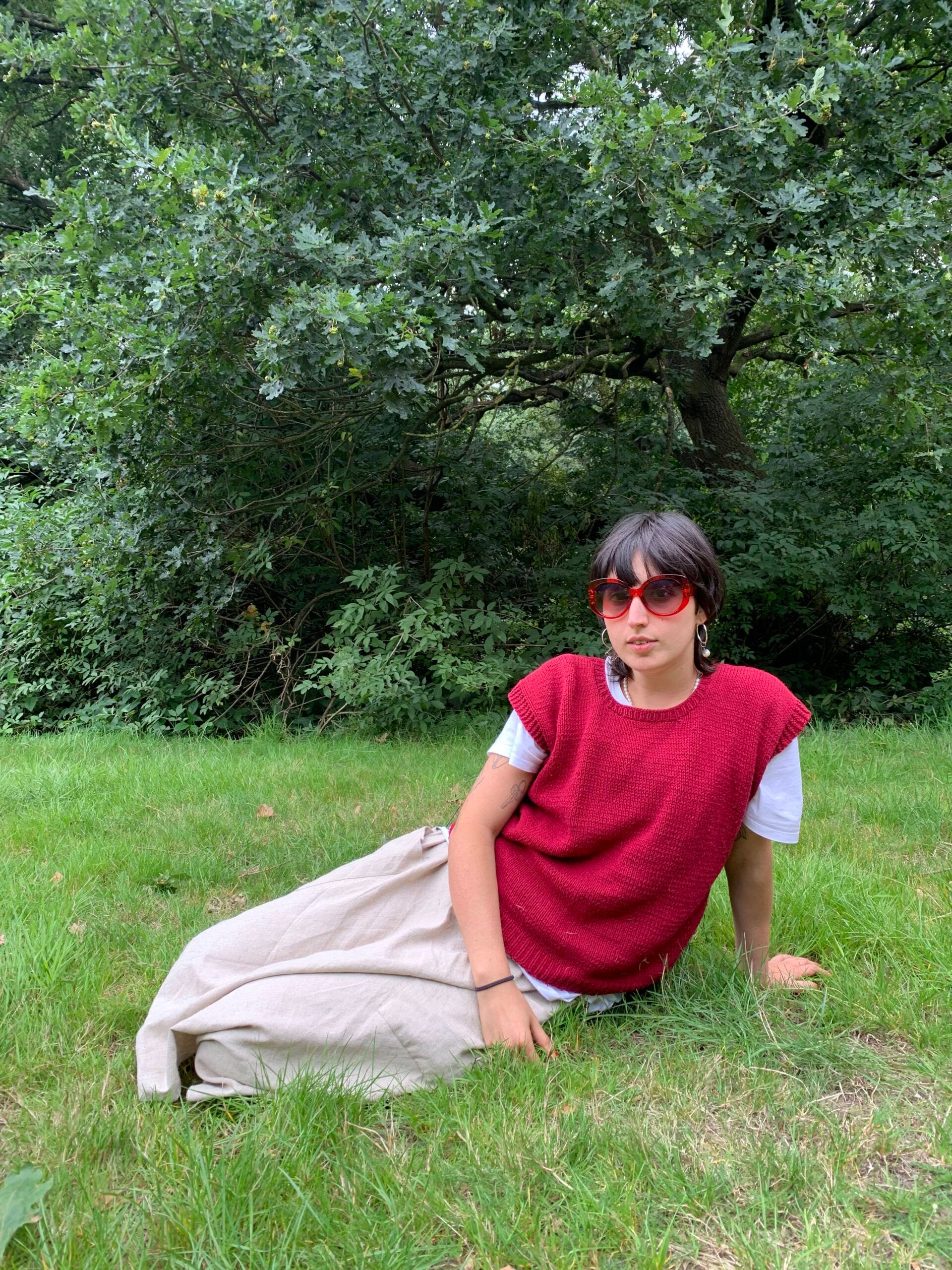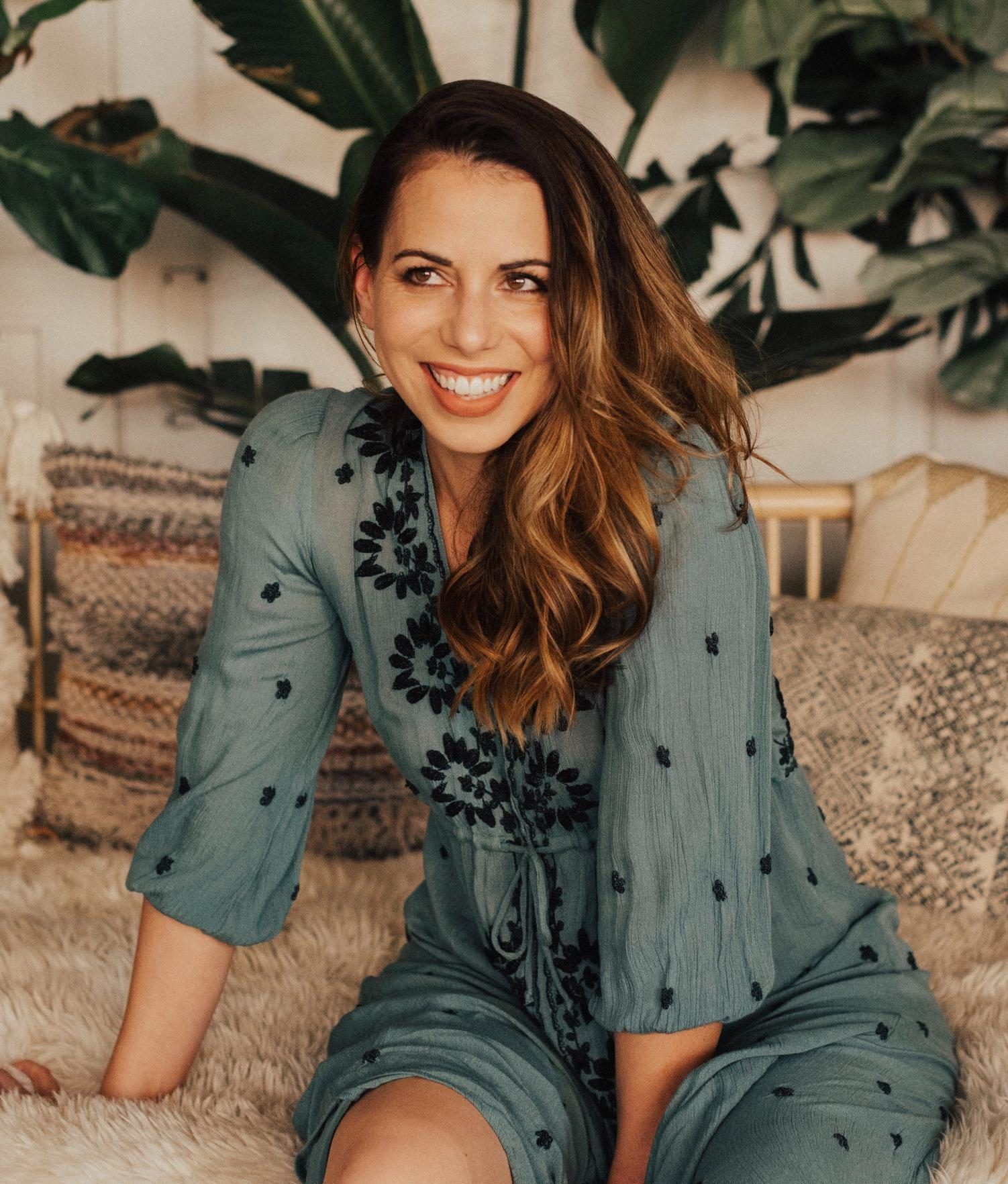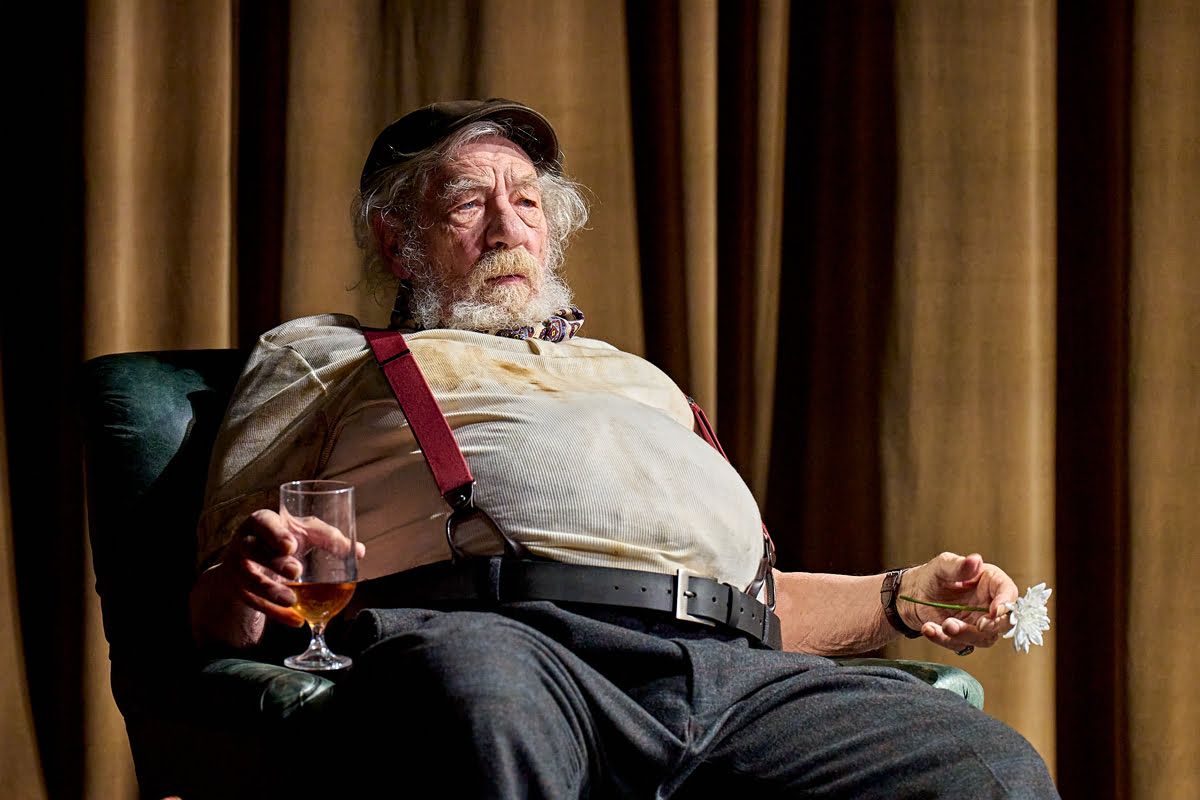
Ella Monnerat
Harper Walton reviews Ella Monnerat’s monologue The Soundproof Box Game, followed by an interview with the interdisciplinary artist and writer.
“My body is the only space worth writing about,” Ella Monnerat says. “The only thing I understand.”
Right now, their body is an impenetrable object. They’re sitting on a chair, back to the audience. Also on stage, their friend sits opposite them, facing us. But she will never speak. It’s almost as if we’ve intruded on a one-sided conversation we weren’t supposed to hear. To begin the performance, there was no introduction. No preamble. Not even a title. Monnerat just started talking, and we started listening.
We’re at The Old Library in New Cross, Southeast London. For the next fifteen minutes, Monnerat enthrals us with their monologue. And they don’t even need to look us in the eye. Their words engender a world inhabited by objects, bodies, buildings. Anything can stand out, like St Paul’s and Tate Modern, or exist in peripheral vision, unregistered. Monnerat is obsessed with how bodies exist in different spaces. At a car boot sale, the speaker, who may or may not be Monnerat themselves, buys a dress “just to establish [their] presence in the space,” as if being a passive observer was insufficient. Is this a move to conform to societal pressure, or to assert themselves as an active participant in the situation? What’s at stake if the speaker fails to establish their presence?
In Monnerat’s world, everything feels alive, every thing feels alive: from a leather jacket to sticks on a riverbank in Bahia to the green door of a local building they thought they’d never seen before, but was there the whole time. Objects, bodies, buildings, all given equal weight. Are they anthropomorphised through our perception, or are we objectified through our coexistence?
A synaesthetic magical realism runs through Monnerat’s monologue. In this world that is real and not real, “murky water” tastes “sweet.” A young Monnerat suffers from labyrinthitis, but thinks it’s just how the world feels, spinning as it circles the sun. A medical experiment in a “soundproof box” becomes a “game.” It is only as adults that we can be aware of our mother’s fear. Monnerat recalls the body horror of “a tiny camera attached to a very long wire up my nose… I watched as it travelled all the way down my throat.” Perhaps this body is not so impenetrable after all.
Monnerat remembers seeing a poster in the doctor’s room: the body is our general medium for understanding the world. But Monnerat’s body is not a “general medium,” and their perception of the world is far from average. “I look at the inside of my throat with the same level of recognition as when I look at myself in the mirror,” they say, the “box game” having become a yearly habit.
I know it like the back of my hand, the saying goes, but some of us have body parts even more familiar. For some, our pain is inseparable from the body that produces it. We become so used to existing off-balance that normality appears skewed.
An ex-lover, Monnerat reveals, “told me right after he fucked me for the first time that he had pretended to be colourblind for ten years” just to avoid copying from the board at school. There is a twisted comfort in the knowledge that no one can “crawl inside” our minds and see our truths behind the narratives we create for others.
Monnerat is keenly aware of the danger of lying about our perception – to others, and to ourselves. Their faux-colourblind ex-lover “lost himself to the world he imagined.” How can we know which sensory perceptions matter, when “the amber light passing through stained glass in churches makes [Monnerat] cry sometimes, but so does chopping onions”?
Monnerat’s unaverage life is one of hypersensitivity and existential overload. When their “leather shoes [are] filled with water,” their muddy feet remind them they “can never be separate from this thing [they] call [their] body.” The “screeching sound of the Jubilee line… pulls [them] from within and leaps [them] into a state of hyper-aware dislocation.” Under constant bombardment from external stimuli, the body becomes a refuge, an escape route.
Monnerat sees the “appeal” of “trying to live and write and think outside of the vessel [they] inhabit,” reminded of a lover of a friend (or lover, the direct address leaves this ambiguous) who “cares for his plushies as an extension of himself.” But it seems that the ability to extend beyond the body doesn’t come naturally to them, and ultimately, “all [they] have to offer” is how they see the world from within their unique subjectivity. “This is all there is,” they say, “the birds and the jackets and the background noise, the sound of my own hesitation.” Anyone in the audience could tell them that all they have to offer is more than enough.
Monnerat’s world is in a constant state of flux. From their sensory issues including partial deafness and a deviated septum, to their migration from Rio de Janeiro to London. In their world, “a girl becomes a woman becomes a girlfriend becomes irrelevant… just another presence around [their] grandparents’ dining room table.” But then that person becomes a friend, and gains a name, Camilla, standing out from the others in the monologue mentioned only by pronouns. Camilla paints pigeons. Why? Her explanation shifts from Portuguese to English. In the performance, Monnerat holds up Google translate, and a robotic voice speaks to us in a language we can all understand:
“The pigeon is a representation of life, death, routine. I paint pigeons who have been run over, torn to shreds. I paint pigeons on top of bins. I paint pigeons on the ground, eating. It’s always there, you know? We know that but we don’t pay attention.”
Pigeons are always moving. Most of us don’t know where. We see them as pests, hassling us for scraps. But in World War II they delivered top-secret messages tied around their ankles. Nowadays, most pigeons I see are missing a foot or two.
Everything is coming to an end. Monnerat’s old neighbour is dead, and her dog too. And “the tree where my favourite swing hung high,” they say. “Termites. The first time I remember feeling alone in the world.” When I look at them on stage now, I wonder if they wish they were alone. I wonder if secrets are just differences people haven’t admitted to yet.
“Your face looks the same even when your name is forgotten,” they say. Is this an acceptance of a universal truth, a comforting thought, or a warning? I suppose our names will all be forgotten in the end.
Monnerat’s language itself shifts – poetic, questioning, reaching beyond the boundaries of the speaker’s self and striving for answers larger than us all. Voice heavy with the weight of personal history, Monnerat establishes banal scenes, then shocks us with voyeuristic intimacy.
Ironically, for a writer whose perception of the world is affected by sensory issues such as weak hearing and damaged olfactory receptors, their writing is more vivid and affecting that most I’ve read or heard. Still, they question the relationship between a person’s senses and their ability to write:
“I do not have a sense of smell, I want to say when you encourage me to be more descriptive. I am partly deaf in my left ear, I want to say when you encourage me to write from another person’s point of view. Maybe I would be a better writer if I finally got surgery for my deviated septum. Or maybe I’d just be able to smell the tobacco in my room.”
If our perception creates the world around us, then no wonder Monnerat’s literary dreamscapes are so delightfully off-kilter. Their monologue ends with exasperation at the limits of comprehension: “you don’t understand a word I am saying.” Are they talking to us, or to someone else, who can’t hear them, perhaps the person who needs to hear it the most? Whoever they’re addressing, I’m just glad I was in the audience to overhear it.
I had the chance to interview Ella Monnerat in their sunny, wood-floored apartment in an ex-council estate in East London. Their body seems to feel at home here, but when I ask them how they’re feeling, they say they “have a lot going on this weekend.” They quickly realise what they just said – “it’s crazy that my answer to ‘how are you feeling’ is a professional thing.” Clearly this is an artist whose personal and working lives, for better or worse, are inseparably blurred.
How does your experience in the diverse disciplines of editing, writing and events organising inform your artistic practice?
I don’t see them as necessarily separate things. The form of my work and what it’s labelled as comes secondary. My background is in documentary filmmaking. That’s what I started doing as a teenager because I just wanted to talk to people. I was really shy and awkward. So I thought, “hey, an interview is a great excuse to have a conversation,” and kind of built from there. The editing aspects came from video editing, which I then used in writing.
Writing has always been more of a personal thing to me. It’s only recently that I realized that’s actually what I wanted to do professionally. With events, it’s very much the same. I just wanted to have a chat with people and ended up producing these bigger things. It’s all very organic and connected and it’s quite hard to pinpoint how one thing informs the other.
How do these disciplines overlap or speak to each other?
If I’m reading a book, I’m making notes in the margins: of the structure of sentences and how I feel about them. I often highlight random phrases because I’m like, “oh, this is very well structured from an editing point of view.” The other day, my friend picked up this book that I have, and was like, I can’t believe you have a note on this saying, “whoever edited this is really good at their job!”
I edited my friend Katrina’s zine Mixtape at the start of the year, which was an autotheoretical piece bringing together playlist and prose. That made me want to write my own thing because with the kind of writing that I do, I’m always playing with different references. I’ll start from a personal thing and then bring in other voices.
You certainly wear your influences on your sleeve. In both your written work and your workshops, you heavily use epigraphs and quotes from other writers as a springboard for new ideas. Tell me about your relationship with intertextuality, and when you know a passage speaks to you.
You know how with some people, you’ll be having a conversation with them and they’ll just bring up a random film reference out of absolutely nowhere? Never been able to do that. Really value people who can do that. But I read a book once and one or two sentences will really stand out to me, and I’ll carry that around randomly in my brain. I start from the personal because I’m thinking about something that happened to me and I want to write about it, and then immediately my brain connects different people’s work to that. I was writing a piece the other day because I wanted to consider the ethics of writing about other people, and I was dealing with that in my personal life. And then I was listening to a song as I was writing, and the song reminded me of the whole background of this artist. I started doing research on the artist, and that was incorporated into the text. I read a lot and I remember little bits that inform my personal life, which then informs my work.
Do you see organising and facilitating events as purely logistical, or can it be an artistic practice in its own right?
It’s absolutely an artistic practice in its own right. Putting people together in a room and making them feel inspired and leaving inspired. That’s a skill in itself, and it took me a really long time to realize that that was the case. I co-run Gut Feeling, a writing feedback group, and for a long time I thought, “oh, this is just something I do. Anyone could do this.” But there’s something specific about Gut Feeling that you don’t get in other groups. Other groups have something specific that we don’t. But there’s a curating aspect to it. You need to be in tune with the people in the room and get what they’re there for and what they want out of that, even if you don’t know them. I think that requires doing your own artistic practice. You couldn’t ask me to run a good workshop about ceramics. I couldn’t get in that mindset.
What other tools and materials inform your artistic practice?
Music guides me a lot of the time. When I’m writing, I always need to listen to specific songs. I’m a terrible painter but I paint quite often, if there’s a topic that I want to explore in my creative practice, but I can’t figure out the words for it. Because words are often not good enough.
I will start drawing the theme. I remember last year I really wanted to explore my grandfather’s death in my writing but every time I sat down to write, nothing came to me. And then I did this series of drawings about that. And he wasn’t present in any of them, his death wasn’t present. It was usually me sitting down smoking a cigarette somewhere or reading a book. It wasn’t about his death. But the act of drawing that over and over and over, that put me in a mindset where I could explore it in writing.
In The Soundproof Box Game, you wrote that “the body is the only space worth writing about.” Do you believe this? How does your artistic practice support this claim?
I don’t fully back that when it comes to other people’s practice, but I think the body will always be what guides the work. Whether or not you address it. I very frequently address it because I’m hyper aware of it, so I might as well start from there and play around with it.
Your writing blends autofiction and autotheory to great effect. How does the relationship between fiction and non-fiction affect your practice?
I think fiction comes out for two reasons. The first is: I want to protect the people around me. And I know that I feel comfortable saying things about my life, but that doesn’t necessarily mean that the people around me do. Even if they do, sometimes I’ll send someone a piece and they’ll be like, “Yeah, you can publish anything you want about me.” And then they read it and go, “is that how you see me?” And sometimes they’re upset about it. So I decided that that’s not something I wanted to do often.
I think there are many ways to convey an experience and how it feels and how that impacts you that don’t necessarily need to state the facts of that experience. Alexander Chee says, “Write the situations, but not the facts of your life.” I think a lot of times fiction comes in to fill a gap that I can’t fulfil with the language that I have from my life.
There are other times where it’s not even about protecting people. I struggle to verbalise a specific feeling through language, and I have to find different ways of doing that. There’s a piece that I wrote for the Gut Feeling anthology called Blue, and there’s a part of it where I’m talking about my sister having health issues and us going to a doctor’s appointment. That happened. I was so stressed that I have no memory of that visit because I was freaking out. I was there. I know that it happened. I don’t remember anything about it, but I had to write about it, which means what I wrote was completely different from what actually happened. I sent it to my sister and asked, “Are you cool with me publishing this?” And she said, “Yeah, absolutely. But that’s not what happened at all.” I was like, “Yeah, I know that’s not what happened, but I can’t tell you what happened. So I have to play with the facts.”
I think I write a lot about trauma. Have you read An Archive of Feelings by Ann Cvetkovich? It’s one of my favourite books ever. It’s about how to create an archive of trauma, specifically about lesbian culture, but it’s very much about all of the things that go into experiences of trauma that are don’t tend to be included in archives.
Anyway, let’s have a cigarette.
Ella Monnerat is an interdisciplinary artist, writer, editor and events producer from Rio de Janeiro, based in London. Their work focuses on all things auto (fiction, theory, ethnography) as well as prose poetry. With an interest in exploring themes around queerness, memory, migration, and the body in the digital archive, they specialise in creating and organising projects that focus on embodiment and personal narrative. They aim to document their world and to provide a platform where others can document theirs. They are the co-founder of Gut Feeling and multiple other creative projects that aim to gather and showcase a multiplicity of voices.
Harper Walton was born in Bath and raised in the West Country. They are a PhD English student at Royal Holloway. Their poetry, prose and personal essays have appeared in magazines including Oestrogeneration, Left Brain Media, and The Hackney Anarchist.





